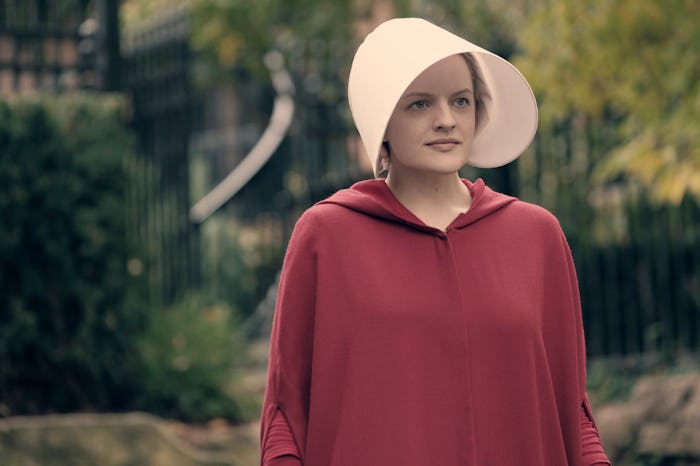Entertainment

'The Handmaid's Tale' Soundtrack Is Full Of Hidden Meanings
In its first three episodes, Hulu's The Handmaid's Tale makes effective use of music and silence equally as it navigates the new world Offred has found herself in. Much of the background music is either instrumental or simply missing, reflecting the oppressive silence that makes up so much of Offred's daily life now, and when very familiar songs suddenly intrude it feels almost shocking. It's an abrupt reminder that though the world has changed visibly, it's still the same place. Offred's old life is not so far in the past at all, and the song choices on The Handmaid's Tale soundtrack illustrate that fact while being incredibly fitting for the scenes they score.
The fact that the songs are so familiar feels notable. These aren't deep cuts, for the most part; when a song takes over, odds are it will be one you know or at least have heard before. In a way, the music acts as a flashback, giving audiences hints of the women who existed before they were so unceremoniously erased from their own lives. The songs are a connection to the past, bridging the gap between those familiar days and the unfamiliar present. Whether it's Offred's brief moment of triumph or Janine singing to the baby she won't be allowed to keep, music keeps the world of Gilead recognizable. (Spoilers from Episodes 1, 2, and 3 ahead!)
"You Don't Own Me" By Lesley Gore
Some of the most notable songs appear just as the episode is ending, and continue to play over the credits. In the first episode, "Offred," right after she reveals her real name (June) and her decision to survive no matter what, Lesley Gore's "You Don't Own Me" kicks in. The message is obvious. They can take everything from June, but not her identity.
"Don't You (Forget About Me)" By Simple Minds
At the end of "Birth," as Offred feels momentary power and even hope, there's the song most people associate with the fist pump at the end of The Breakfast Club. That association helps lend the scene its triumphant air, but also underscores something darker when Offred finds her friend Ofglen has been replaced. Lyrics like "will you recognize me?" echoing over Ofglen's replacement highlight the dissonance of the moment.
"Waiting for Something" By Jay Reatard
"Late" concludes with Ofglen's horrifying realization that she has been genitally mutilated as "Waiting for Something" plays. The chaotic sound of the song echoes her pain, confusion, and anger while the lyrics hint at her resolve: "they won't get me." Even the album cover seems to call to mind Ofglen in the scene with its sterile white background and obvious violence — though the blood wasn't visible in her case.
"Wildfire" By SBTRKT
"Wildfire" plays over the flashback to a party during Moira and Offred's college days, when they could still be carefree and have fun. Dropped in the middle of Offred's arrival at the Red Center, where she will learn to be a handmaid, it's almost jarring; it shows how much the world has changed in such a short time.
"Three Little Birds" By Bob Marley & The Wailers
"Three Little Birds" is the song Janine sings to her newborn daughter the first time she breastfeeds her. It definitely seems to be a remnant of Janine's past, as the scene is full of painful nostalgia over her first child, a son named Caleb. Is it Janine's favorite song, perhaps? Something she used to sing to Caleb? There's also irony in lyrics that promise everything will be alright when nothing could seem further from the truth.
"F**k The Pain Away" By Peaches
Offred listens to "F**k the Pain Away" while going for a jog with Moira in the time shortly before the United States finally becomes Gilead. Like "Wildfire," it illustrates a freer time for Offred and for all women: full of personality and not having to hide it, living their lives just how they wanted.
"Heart Of Glass (Crabtree Remix)," By Blondie
The haunting remix of Blondie's hit song "Heart of Glass" accompanies the protest Offred and Moira attend after new laws remove women's right to own property. What begins as a peaceful protest quickly devolves into violence, and the song (though about love, technically) conveys the feelings of disbelief and betrayal Offred feels over what has been done to the world.
In other moments — the tinkling tune at the supermarket like a 1950s sitcom theme — music can showcase the absurdity of Gilead, or how robbed of life and personality it is, just like the women who now inhabit it like ghosts. But these songs show that life has not be entirely extinguished. They may have to hide it behind silence and subservience, but inside all of these women there's still music.